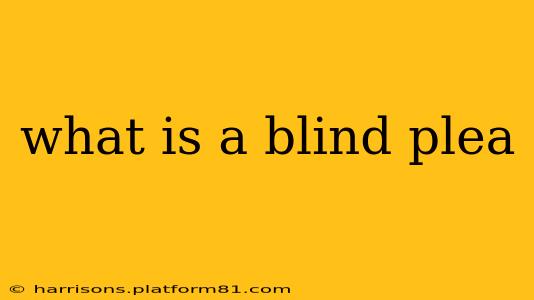A "blind plea" in the legal context refers to a situation where a defendant pleads guilty or no contest to a criminal charge without knowing the specific sentence they will receive. This differs from a plea bargain, where the prosecution and defense negotiate a specific sentence in exchange for the plea. In a blind plea, the judge retains complete discretion in determining the punishment. This means the defendant is taking a significant risk, hoping for leniency but potentially facing a harsher penalty than anticipated.
Why Would Someone Enter a Blind Plea?
Several reasons might lead a defendant to enter a blind plea:
-
Weak Evidence: If the prosecution's case is weak, a defendant might believe their chances of acquittal at trial are slim. A blind plea allows them to avoid the risk of a much more severe sentence if convicted after a trial.
-
Avoid the Cost and Stress of Trial: Trials can be lengthy, expensive, and emotionally draining. A blind plea offers a quicker resolution, minimizing the stress and financial burden associated with a trial.
-
Desire for a Speedy Resolution: Some defendants prioritize resolving the case quickly, regardless of the potential sentence, for personal or professional reasons.
-
Negotiating a Lesser Charge: Sometimes, a blind plea is part of a broader negotiation. The defendant might plead guilty to a lesser charge in exchange for the judge's consideration during sentencing. Even though the sentence is unknown, the reduction in the severity of the charge is a benefit.
-
Hope for Leniency: A defendant might believe the judge will be lenient in sentencing, considering mitigating circumstances such as a lack of prior record, remorse, or other factors.
What are the Risks of a Blind Plea?
The primary risk is the uncertainty of the sentence. The judge might impose a harsher penalty than the defendant anticipated, including prison time, fines, or probation. This makes blind pleas inherently risky, and defendants should carefully consider all potential consequences before agreeing to one.
What Happens During Sentencing After a Blind Plea?
After a blind plea, a sentencing hearing takes place. The judge will consider various factors including:
- The severity of the crime: More serious crimes generally lead to harsher penalties.
- The defendant's criminal history: A prior record significantly impacts the sentence.
- Mitigating circumstances: Factors that lessen the defendant's culpability, like remorse, cooperation with authorities, or personal hardship.
- Aggravating circumstances: Factors that increase the severity of the crime, like the use of a weapon or significant harm to the victim.
- Pre-sentence investigation report: A report compiled by probation officers providing a comprehensive overview of the defendant's background and the circumstances of the offense.
Is a Blind Plea Right for Me?
The decision to enter a blind plea is a highly personal one with significant legal ramifications. It is crucial to consult with an experienced criminal defense attorney before making this decision. Your attorney can help assess the strengths and weaknesses of the prosecution's case, explore alternative options, and advise you on the best course of action based on your individual circumstances. This decision should not be taken lightly and requires careful consideration of the potential consequences.
